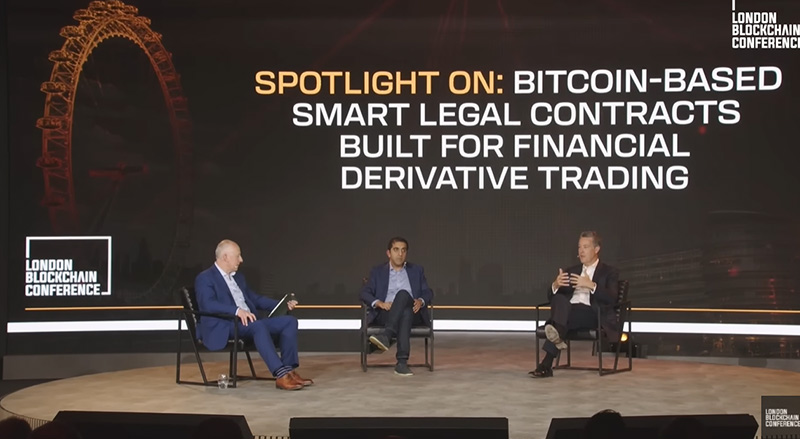BSV blockchain-based smart contracts are already disrupting the financial derivatives industry. However, the industry is still nascent and there are many exciting opportunities and areas to innovate.
This was a main panel discussion at the recent London Blockchain Conference which was hosted by Richard Baker (CEO of Tokenovate) and included Hirander Misra (CEO of GMEX and the SECDEX exchange) and Scott O’Malia (CEO of ISDA and former CFTC regulator).
A key focus of the panel was the successful execution of the world’s inaugural smart legal contract designed for voluntary carbon credit derivatives trades, adhering to the industry-standard definitions set forth by the International Swaps and Derivatives Association (ISDA).
A world first
Tokenovate is a financial services company providing distributed financial market infrastructure (dFMI) which enables programmatic lifecycle event management of the pre-trade to post-trade workflow for OTC and exchange-traded derivatives.
The group recently partnered with the GMEX Group to successfully demonstrate the creation of a BSV blockchain-based, high-quality, smart legal contract for waste-to-energy VCC trades. The trades originate from the Bio-CNG Project AJS Fuels in Gujarat, India which uses biogas technology to capture methane from animal waste.
This was achieved by integrating the Tokenovate dFMI into the ZERO13 Hub, a distributed orchestration layer which digitally interconnects carbon participants, registries and exchanges across jurisdictions to trade, clear and settle VCC spot and derivatives contracts.
The trades were executed on the regulated SECDEX exchange, which is connected to the Universal Carbon Registry of voluntary carbon credits, registered via the ZERO13 Hub.
BSV blockchain is a natural fit for carbon credits
Baker explained that the BSV blockchain is a natural fit for the carbon credit industry as it requires two key components – auditability and immutability. The panel also discussed the ongoing concerns surrounding ‘greenwashing’ which have been a prominent topic of discussion in recent times concerning carbon credits. As an extension of this, the panel also discussed how some companies are exploiting well-meaning environmentally-friendly initiatives to create an illusion of being environmentally responsible while failing to take substantive actions in practice.
‘They’ve got to be transparent, they have to be auditable, they have to be clear: and we have to be able to document all of this,’ Baker said.
O’Maila added that the voluntary carbon market can play an important role in channelling financing to green projects, technology and infrastructure that need investment. ‘The digitisation of derivatives markets will significantly improve efficiency and set the foundations for growth at scale,’ he said.
Blockchain and ESG
The BSV blockchain can transform how organisations tackle environmental, social, and governance (ESG) concerns. By establishing a secure, transparent, and unalterable record of data, blockchain holds the potential to enhance accountability and transparency across various ESG domains.
A key domain where blockchain can wield substantial influence lies in the monitoring and validation of sustainable practices. Numerous companies assert their commitment to sustainability, yet stakeholders often encounter difficulties when attempting to confirm these assertions.
Leveraging blockchain for the monitoring and authentication of sustainability data enables companies to furnish stakeholders with a more precise and transparent depiction of their environmental impact.
